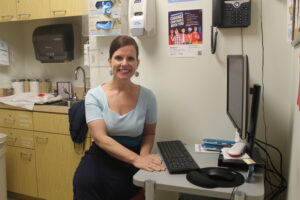By Greg Hernandez
When it comes to cervical cancer screenings, the Los Angeles LGBT Center has worked hard to develop programs in its clinics that are patient-centered and trauma-informed.
There are some very important reasons for that: lesbian, bisexual, or queer women and trans, gender non-conforming, and non-binary people often face more challenges than cisgender, heterosexual females in maintaining their cervical health.
“Cervical cancer is the third most common cancer globally yet often times access to regular screening can be difficult for our community due to misinformation, discomfort in scheduling appointments, fear of being mistreated or getting refused service, lack of insurance, and clinicians’ lack of knowledge,” the Center’s Trans* Lounge Program Manager Gina Bigham pointed out while moderating a recent virtual panel addressing critical issues in cervical health.
Cervical cancer is highly preventable but there are still nearly 13,000 cases of the potentially deadly disease reported each year. Cervical cancer screening, commonly referred to as a Pap smear or Pap test, is recommended for anyone with a cervix regardless of gender identity, sexual activity, and whether or not they have received the HPV (human papillomavirus) vaccine.
The Pap screening looks for cell changes on the cervix that might become cervical cancer without the appropriate treatment. The HPV screening looks specifically for the presence of the virus, some types of which can lead to cancer.
While someone can get HPV though vaginal, oral, or anal sex, it can also easily be transmitted through intimate skin-to-skin contact such as hand to genital.
“Since there are no symptoms, there’s no way to know if you have HPV unless you are screened for it,” the Center’s LVN Care Coordinator Mar Marqusee explained during the panel discussion. “Thankfully, cervical cancer is actually preventable through a combination of the HPV vaccine and cervical cancer screening. We offer both of these things at the Center.”
But Marqusee pointed out that “it’s hard for patients to talk about sexual orientation or gender identity with providers that they don’t feel comfortable with, who they don’t know. There are a lot of societal barriers for this population.”
The ideal way to screen for cervical cancer is to have the provider use a speculum to visually examine both the cervix and the whole area both internally and externally.
“What’s really important about cervical cancer screening and the providers that are offering it is that we really need to make sure that they are clinically competent and that they are able to provide care specifically for the LBQT population,” Marqusee said. “What’s great about the Center and our Audre Lorde Health Program is all of the providers are really well versed in this nuanced care and really work hard to make patients feel comfortable so they feel that they can disclose things to help with their health maintenance. As a provider, we are going to be a safe, welcoming space for that information.”
Minimizing Exam Trauma
Pelvic exams can be traumatic for anybody but especially for somebody who might have some genital dysphoria, the panel members said. An examination can also be physically painful for trans men who are on testosterone because the cells and the tissues in that area change so that they are no longer elastic.
“I think every patient that I have can tell us a bad story about a previous experience with a provider about pelvic health where they either were in pain and nobody listened, where they felt the provider was too rough or too fast,” the Center’s Chief Medical Officer Dr. Kayti Duffy shared. “I always say to patients, ‘This exam is uncomfortable but it should never be painful.’ If it crosses over to pain, the provider is doing something wrong.”
 Duffy *(Pictured) wants Center clients to feel they have a sense of autonomy throughout the exam, that they can ask questions and can stop the procedure at any time.
Duffy *(Pictured) wants Center clients to feel they have a sense of autonomy throughout the exam, that they can ask questions and can stop the procedure at any time.
“They have the power in that room,” she pointed out. “That’s the initial conversation I have with everybody. I’ve had patients actually cry when I’ve said that because we’re in 2022 and no one has ever said that before to these patients. I want their experience here to be unique.”
Center clients can bypass the speculum exam if they are too uncomfortable with it by privately collecting the sample themselves.
“Creating the self-swab initiative has been a game changer as well,” Duffy said. “I feel very confident that we are providing gold standard care to these patients.”
Leading the Way
The Center’s deep concern for the unique needs of trans, gender non-conforming, and non-binary people was clear when
Duffy personally took on the clinical laboratory where the Center sends its cervical cancer screenings.
The lab was repeatedly rejecting specimens from trans men, assuming the specimens had been sent in error. Duffy tenaciously challenged the company’s policy and provided them with research and patient stories to highlight that anyone with a cervix, no matter how they identify, needs to be screened for cervical cancer.
She finally succeeded in getting the company to agree to revise its algorithm so that these specimens would no longer be rejected automatically.
“I think in that moment we changed the world a little bit,” Duffy said. “This is the way we make change. We advocate for our patients until their needs are recognized by these companies who want to do business with us. It was a big win. It was one of the happiest days of my life, next to the birth of my kids. I cried. It was a great moment.”
For more information about the Center’s Audre Lorde Health Program, visit audrelorde.lalgbtcenter.org
The Center accepts most insurance plans and can help people who are uninsured or underinsured qualify for assistance programs. Visit lalgbtcenter.org/insurance_plans for more information.


